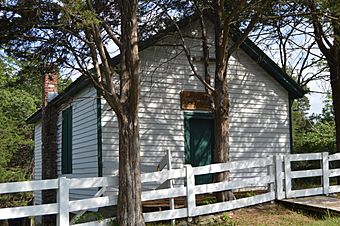Cedar Hill Church and Cemeteries facts for kids
|
Cedar Hill Church and Cemeteries
|
|

Church, front and northern side
|
|
| Location | Cedar Hill Church Rd. and Kygers Hill Rd., near Lexington, Virginia |
|---|---|
| Area | 1 acre (0.40 ha) |
| Built | 1874 |
| NRHP reference No. | 01001570 |
Quick facts for kids Significant dates |
|
| Added to NRHP | February 11, 2002 |
The Cedar Hill Church and Cemeteries are a very important historical place in Rockbridge County, Virginia. This site tells the story of the African American community in the area, especially after the Civil War. It includes a small log church that was also used as a school, and two cemeteries where people from the community are buried.
Contents
Cedar Hill Church and Cemeteries
A Special Place in History
The Cedar Hill Church and Cemeteries are located near Lexington, Virginia. The church building was constructed in 1874. It was a simple log building that served as both a place of worship and a schoolhouse for the local African American community.
The land for the church was given by a white farmer named John Replogle. He transferred the land to "Trustees for the Colored Baptist Congregation." This gift helped the community establish a permanent place for their church and school.
The Church Building
The church building itself is a one-story, one-room log structure. It was covered with plain and beaded wooden boards. This simple design was common for many community buildings built during that time.
The Cemeteries
There are two cemeteries at Cedar Hill. The first cemetery was started right behind the church. Today, you can see scattered field stones that mark the graves there.
Because the ground was very rocky, it was hard to dig graves in the first cemetery. So, around 1890, a new cemetery was started in a different spot. This new cemetery is still used today.
A Community's Journey
The Cedar Hill congregation was formed not long after the Civil War ended. Many of its members were African Americans who lived and worked on white-owned farms in the area.
Before the church building was constructed, the congregation met in different places. At first, they gathered in a log dwelling southwest of where the church stands now. Later, they met under a large oak tree. This tree was about one and a half miles west of the current church.
This oak tree meeting place was similar to "brush arbor churches." These were temporary shelters that many freed African American congregations set up in Virginia after the Civil War. It is said that many members were buried near this special oak tree, which was known as the "Gospel Tree."
Sadly, the "Gospel Tree" was struck by lightning and destroyed around 1890. However, its stump can still be seen today. A piece of a limb from the tree is kept at the present church as a historical reminder.
Homecomings and Heritage
By the late 1920s, the church began to lose many of its members. Most people moved to nearby cities like Lexington. They went there to find better job opportunities and schools.
After 1939, the church building was not used for 26 years. But in 1965, a yearly "homecoming" event was started. These annual homecomings are still held at the church on the third Sunday in August. They are a special time for former members and their families to return and celebrate their heritage.
Cedar Hill is recognized as an important site that shows the African American heritage of rural Rockbridge County. The church is listed on the National Register of Historic Places by the United States Department of the Interior National Park Service. It was added to the National Register in 2002.
 | William L. Dawson |
 | W. E. B. Du Bois |
 | Harry Belafonte |



